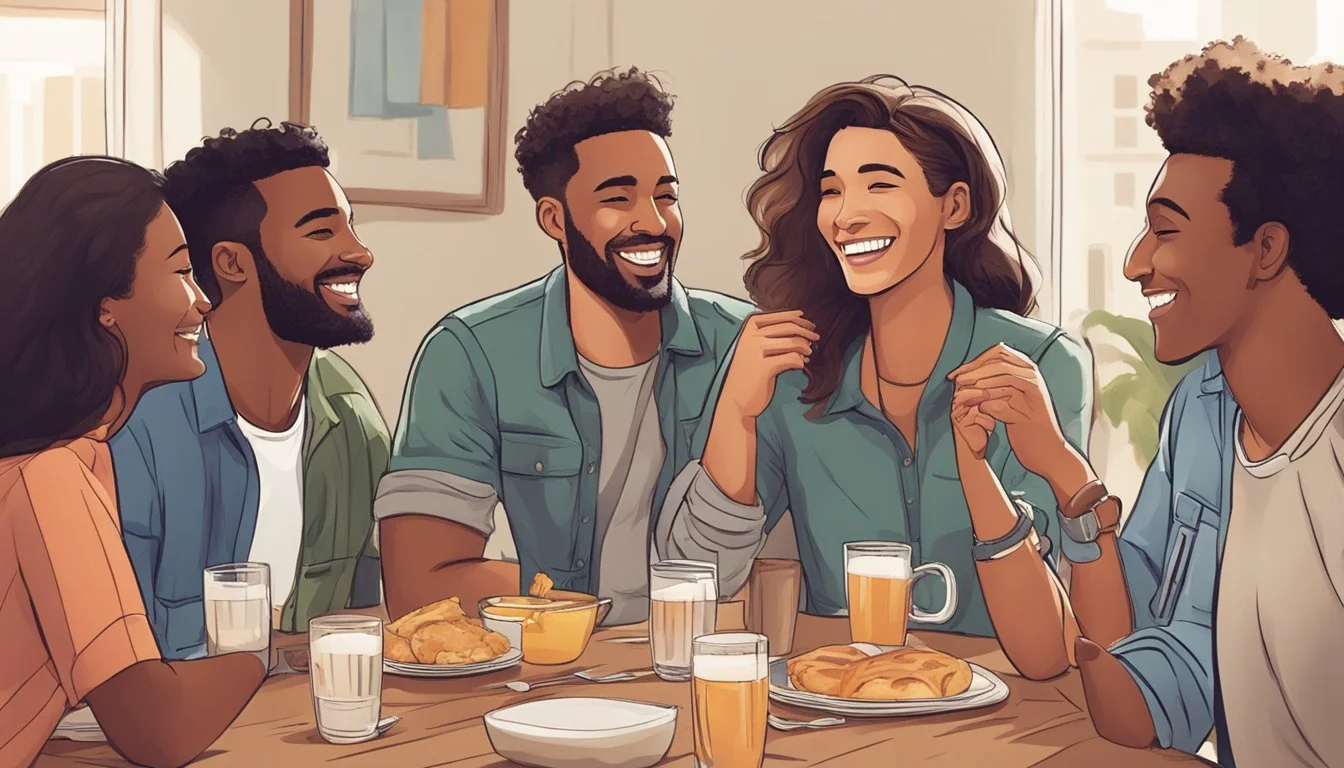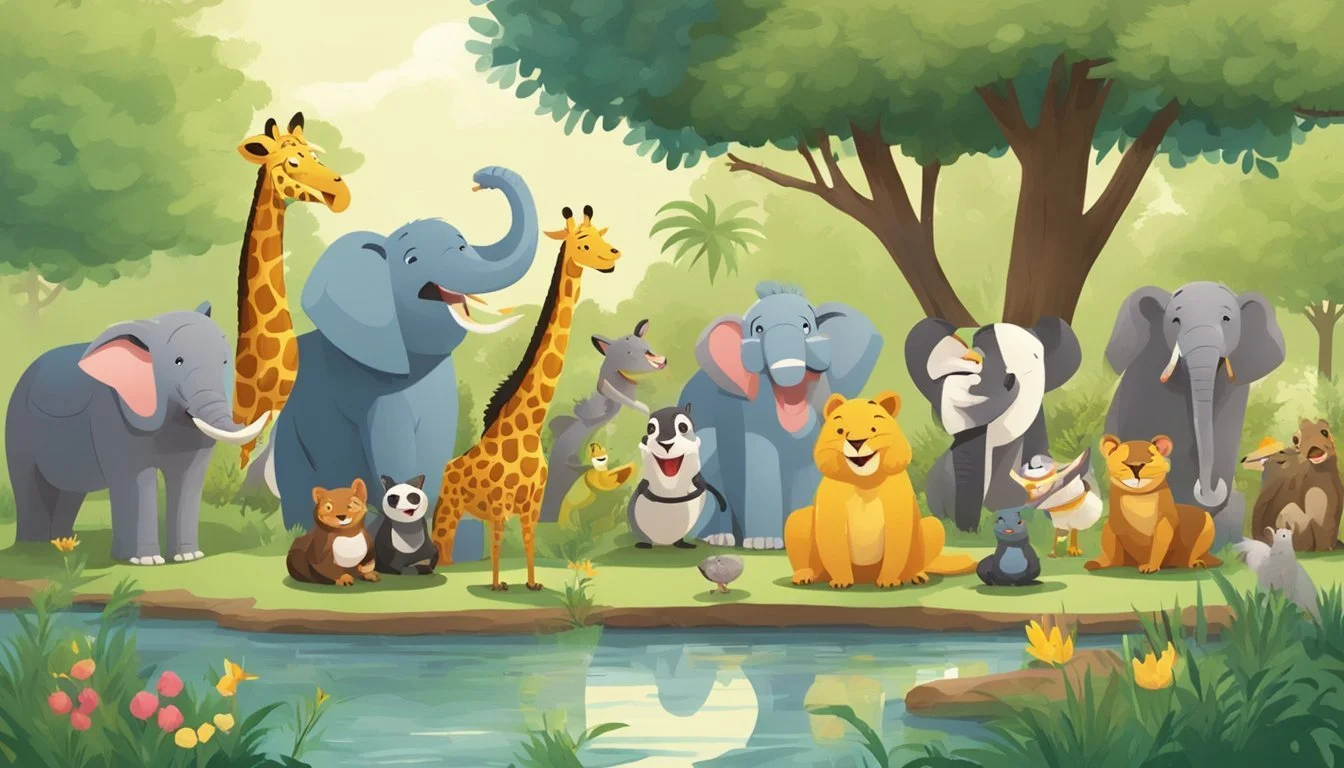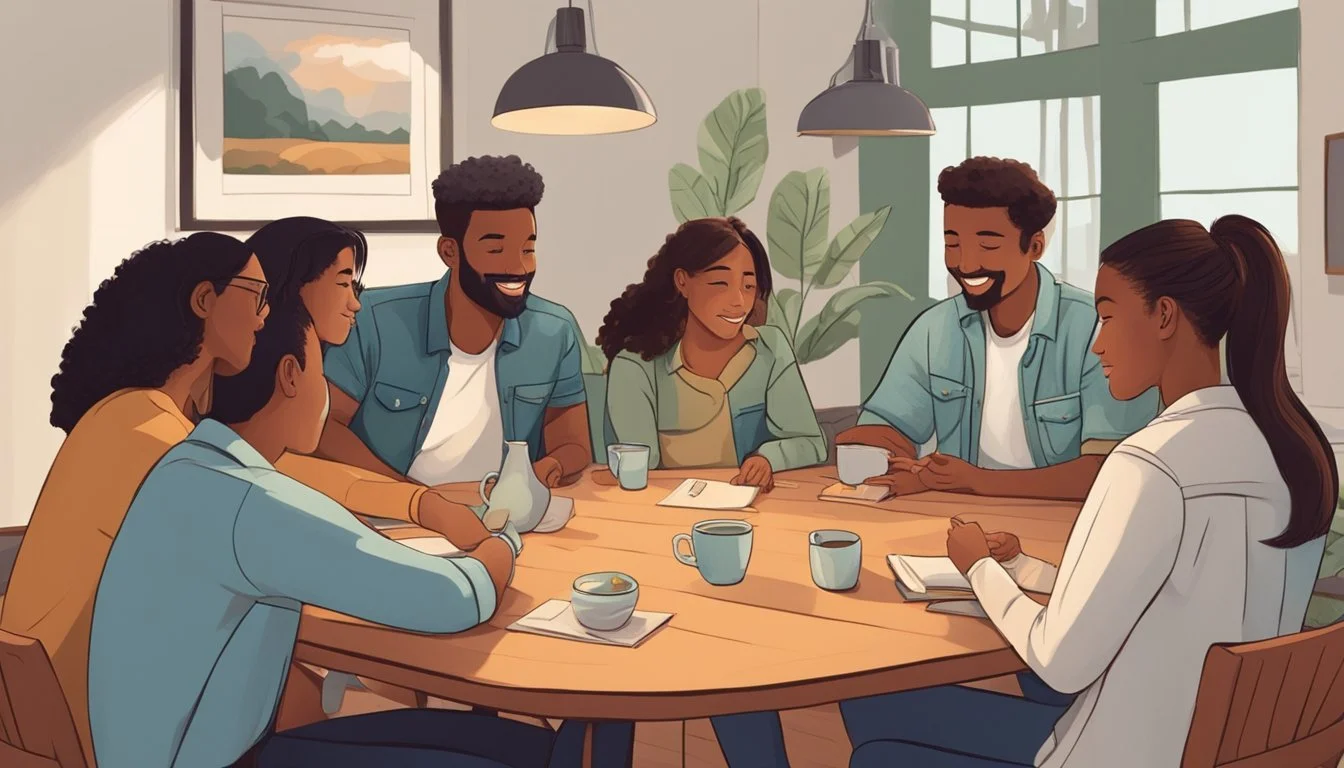11 Friendship Lessons We Can Learn from Our Favorite TV Shows
Insights for Stronger Bonds
Television has a unique way of reflecting and shaping our understanding of relationships, especially friendship. Over the years, a variety of TV shows have portrayed different dynamics of friendships, offering viewers valuable insights into what makes these bonds strong and meaningful.
By exploring the lessons portrayed in popular TV shows, viewers can gain a deeper appreciation of the qualities that nurture lasting friendships. Whether it's the enduring bonds seen in classic series or the complex relationships in modern dramas, each show provides a window into the diverse and enriching world of friendships.
1) Respect Boundaries - Friends (TV Show)
"Friends," one of the most popular TV shows, offers ample lessons on respecting boundaries. An illustrative example is the relationship between Chandler and Joey. Despite being close friends, they maintain personal spaces and understand when to step back.
When Joey dates Chandler's ex, Kathy, they face challenges but navigate these through honest conversations and mutual respect. This demonstrates the importance of communication and respecting emotional boundaries in friendships.
Ross and Rachel's on-and-off relationship underscores this theme too. Despite their romantic history, they often need to define and respect boundaries, especially when they are not together. Their ability to co-parent successfully hinges on understanding each other's limits without overstepping.
Monica and Rachel's living arrangement also highlights the need for boundaries. Sharing an apartment requires respecting personal space and habits. Their friendship thrives because they balance being considerate and addressing grievances openly.
In another instance, Phoebe's candid manner sometimes crosses lines, but her friends communicate their discomfort, reinforcing the necessity of setting and respecting boundaries.
For more on teaching kids about friendship boundaries, this guide can be helpful. Similarly, learning about crucial boundaries in friendships can be further explored through insights from experts.
2) Communication is Key - Gilmore Girls
One essential lesson from Gilmore Girls is the importance of honest and open communication. Throughout the series, characters experience both the joys and pitfalls that come with speaking their truths.
Luke and Lorelai's relationship exemplifies this theme. Despite their deep connection, they face numerous challenges due to miscommunication and unspoken feelings. Their journey underscores how clarity and openness can strengthen bonds.
Additionally, Rory and her mother Lorelai share a remarkable rapport, often discussing everything openly. Their candid conversations help them navigate life's ups and downs, reinforcing the idea that sharing thoughts candidly can enhance understanding.
When characters are forthright, they resolve conflicts more efficiently. This is evident in various friendships depicted on the show, where direct conversations lead to resolution and growth.
Even secondary characters experience the repercussions of poor communication, highlighting the message further. The show suggests that while vulnerability may be daunting, it is necessary for fostering genuine connections.
Communication isn’t just about speaking but also about listening. The series demonstrates that hearing others out and valuing their perspectives are integral to maintaining healthy relationships.
In Gilmore Girls, the recurring theme of communication serves as a reminder of its pivotal role in forming and sustaining meaningful relationships. Whether through casual chats over coffee at Luke’s Diner or more intense heart-to-hearts, the series champions the cause of clear and sincere dialogue.
3) Stand Up for One Another - Stranger Things
In "Stranger Things," standing up for friends forms the backbone of the group's dynamic. Will, Mike, Dustin, and Lucas consistently exemplify this trait. Whether facing school bullies or supernatural threats, the characters prioritize each other's safety and well-being.
The show underscores that true friends defend one another without hesitation. Mike's dedication to Eleven, especially when he shields her from harm and misunderstanding, reinforces this idea.
Lucas and Dustin demonstrate loyalty by showing unwavering support during crises. Their willingness to stand side-by-side, whether in arguments or battles, highlights the importance of solidarity.
Steve and Dustin's unexpected friendship also illustrates standing up for one another. Despite their different ages and backgrounds, they look out for each other, strengthening their bond.
In many episodes, characters risk their own safety to protect friends. This readiness to face danger together enhances their unity and trust, teaching viewers that standing up for friends is vital in any relationship.
4) The Importance of Loyalty - How I Met Your Mother
In the TV show How I Met Your Mother, loyalty is a recurring theme that profoundly affects the characters' relationships. Ted Mosby’s unwavering loyalty to his friends demonstrates the depth of their bond. From supporting Marshall through his career changes to helping Lily resolve personal dilemmas, Ted consistently shows up for his friends.
Marshall and Lily's relationship showcases another layer of loyalty. Despite the ups and downs, their steadfast commitment to each other is a cornerstone of the series. Whether navigating career moves or significant life changes, their loyalty to one another remains unshaken.
Barney Stinson, despite his playboy persona, also learns the value of loyalty. His evolving relationship with Robin Scherbatsky embodies this growth. When he eventually commits to Robin, it represents his understanding and acceptance of true loyalty.
Loyalty is further highlighted in the group’s tradition of always meeting at MacLaren's Pub. This place symbolizes their consistent support and reliance on one another through various life stages. Their loyalty ensures that they remain connected and emotionally supported.
These examples from How I Met Your Mother underscore how loyalty fortifies friendships and relationships, making them resilient and meaningful. Each character's journey provides valuable insights into the importance of being consistently loyal to the ones they care about.
5) Friendships Can Be Messy - Big Bang Theory
The Big Bang Theory demonstrates how friendships can thrive despite being imperfect. Sheldon often causes friction with his strict routines and social quirks.
Leonard consistently navigates the balance between his commitments to Penny and his obligation to Sheldon. This dynamic showcases that patience is vital in messy relationships.
Howard and Raj's friendship also highlights complexity. Raj's jealousy over Howard's relationship with Bernadette often leads to tension.
Despite their differences, the group remains supportive. They celebrate each other's successes, confront issues directly, and grow together.
These characters teach us that friendships can be messy but still fulfilling. Open communication, compromise, and acceptance are key to maintaining these connections.
Sheldon's evolving relationship with Penny further exemplifies this. They clash often but develop mutual respect and understanding. This shows the importance of persistence.
Ultimately, the series illustrates that real friendships are not always smooth but can withstand challenges with effort and care.
6) Embrace Differences - Brooklyn Nine-Nine
Brooklyn Nine-Nine offers a diverse cast of characters who have unique backgrounds, beliefs, and personalities. The show illustrates the importance of embracing these differences to form strong, supportive friendships.
One key example is the relationship between Jake Peralta and Raymond Holt. Jake's relaxed, unconventional style contrasts sharply with Holt's stringent professionalism. Despite their differences, they develop a deep mutual respect and understanding.
Another prominent friendship is between Amy Santiago and Rosa Diaz. Amy is meticulous and detail-oriented, while Rosa is tough and aloof. Their friendship shows how embracing each other's differences can lead to mutual growth and stronger bonds.
The humorous yet supportive bond between Terry Jeffords and Gina Linetti underscores another lesson. Terry's physically intimidating yet gentle nature contrasts Gina’s quirky and unapologetic personality. Their friendship teaches acceptance and the beauty of diverse traits in enriching relationships.
For more detailed insights on the friendships in Brooklyn Nine-Nine, check out the 10 Best Friendships On The Series. This harmonious acceptance of different personality traits highlights the show's message: celebrating diversity strengthens friendships. This approach reflects real-life scenarios where understanding and embracing differences pave the way for deeper connections.
7) Humor Can Mend Conflicts - Parks and Recreation
"Parks and Recreation" showcases how humor can be a powerful tool in resolving conflicts. Leslie Knope often uses jokes and light-hearted comments to defuse tense situations within the Parks Department.
When Ron Swanson and Leslie disagree, Leslie’s witty remarks often help to ease the tension. Her humor creates a more relaxed atmosphere, making it easier for both parties to reach an agreement.
Another example involves Tom Haverford, whose playful banter softens clashes with other characters. His jokes often serve as a reminder to not take conflicts too seriously and look for common ground.
Donna Meagle also demonstrates this with her humor, particularly in her interactions with Jerry Gergich. Despite the frequent teasing, moments of laughter bring them closer and resolve misunderstandings.
Humor isn’t just a way to avoid confrontations but an effective tool to address them directly. The witty exchanges among "Parks and Recreation" characters underline the importance of maintaining a sense of humor.
By keeping conflicts light-hearted, the characters of "Parks and Recreation" show that humor can bridge differences, promote understanding, and foster a cooperative environment. Leslie, Tom, and Donna illustrate how humor can be a valuable mediator in various situations.
8) Support Each Other's Growth - New Girl
In "New Girl," the character dynamics emphasize the importance of supporting each other's personal and professional development.
Jess, for instance, consistently encourages Nick to pursue his writing career. Despite Nick’s reluctance and self-doubt, Jess provides the push he needs, showing that believing in friends can help them achieve their potential.
Schmidt, too, aids Winston by recognizing his need for career direction. He helps Winston explore different jobs until he finds his passion in radio. By investing time in Winston’s growth, Schmidt highlights the value of unwavering support.
Cece and Schmidt’s relationship also offers a lesson in mutual growth. They motivate each other to confront and overcome their respective fears and shortcomings. Cece’s support helps Schmidt recognize and mitigate his obsessive tendencies, while Schmidt assists Cece in pursuing her modeling ambitions.
In a more subtle way, the group as a whole supports Coach when he returns and struggles to reintegrate into their lives. Their patience and inclusive attitude enable him to find a comfortable place within the group again.
By lifting each other up, the characters in "New Girl" illustrate that true friendship involves consistent encouragement and support for personal growth.
9) Be Honest, Even When It's Hard - Grey's Anatomy
Grey's Anatomy has shown many times how important honesty is, even when it's difficult. Characters like Meredith Grey and Christina Yang demonstrate the value of being truthful. Their willingness to face tough truths strengthens their friendships and helps them grow as individuals.
One memorable example is when Meredith confesses her feelings to Derek, knowing it could complicate their relationship. This act of honesty allows them to build a deeper, more authentic connection.
Another example is when Christina tells Meredith about her doubts regarding a major life decision. By being open, they support each other through difficult times.
These moments underscore that honesty, though sometimes painful, is essential for genuine relationships. The show illustrates that it builds trust and lays a foundation for lasting friendships.
When characters face challenging situations, their commitment to honesty often leads to growth and improvement. This reinforces the importance of being truthful, not just to others, but also to oneself.
For more examples of friendship tips from the show, you can explore articles like 10 Friendship Tips We Learned From Grey's Anatomy. Grey's Anatomy provides numerous lessons, making it clear that honesty is a cornerstone of any strong relationship.
10) Celebrate Each Other's Wins - The Office
"The Office" offers valuable lessons about workplace camaraderie, especially in celebrating each other's successes. Jim and Pam often celebrate their colleagues' achievements, creating a positive work environment.
Another example is when Michael Scott hosts various office parties, ensuring every milestone is acknowledged. This practice boosts morale and fosters team spirit among employees.
Additionally, Dwight's unconventional but genuine appreciation for his coworkers highlights how recognition can take many forms. Celebrating wins, no matter how small, helps build stronger workplace relationships.
For more ideas on celebrating team accomplishments, check out these smart strategies from Forbes. Such practices are essential for a thriving work culture.
11) Forgive and Move Forward - Scandal
In the TV show Scandal, the character Olivia Pope often faces betrayal and complex personal dilemmas.
One important lesson from the series is the power of forgiveness, not just for others, but also for oneself.
To achieve this, characters must first reframe their perspectives on mistakes, recognizing that errors are part of human experience.
Olivia often finds herself needing to forgive friends and allies who have wronged her.
In these moments, she models the importance of empathetic communication. This involves actively listening, expressing feelings honestly, and working collaboratively towards reconciliation.
Studies suggest that practicing mindfulness can enhance one's capacity for forgiveness.
Forgiveness allows the characters to maintain strong relationships, despite past betrayals.
By letting go of grudges, they create room for growth and move forward more resiliently.
References
For more on forgiving friends and why it’s important, you can visit the guide on How to Forgive a Friend.
Additionally, insights on using mindfulness to foster forgiveness can be found in the article Let It Go: 11 Ways to Forgive.
The Value of Loyalty in Friendships
Loyalty is the cornerstone of any lasting friendship. It fosters trust, deepens relationships, and enhances mutual respect. Let's explore how loyalty builds stronger bonds and some examples from TV shows that demonstrate this value.
How Loyalty Creates Stronger Bonds
Loyalty in friendships provides a sense of security and trust. When friends remain loyal through difficult times, it reassures each other of their unwavering support. This consistency helps to build a deeper emotional connection.
Loyalty also means standing up for friends in their absence, affirming the trust they place in one another. It's this unwavering commitment that transforms casual friendships into lifelong bonds.
Being loyal isn't only about support during tough times but celebrating successes together. This shared sense of joy and support strengthens the bond even further.
Examples of Loyalty from TV Shows
In "Friends," Joey's loyalty to his friends often leads him to make personal sacrifices. Whether it’s keeping secrets or providing emotional support, Joey's actions illustrate the strength loyalty brings to a group of friends.
"Stranger Things" showcases loyalty through the character of Eleven. Despite the dangers, she remains faithful to her friends, displaying immense courage and dedication.
Loyalty is also central in "Parks and Recreation," where Leslie Knope consistently supports her friends and colleagues. Her unwavering loyalty to her team strengthens their unity and trust in one another.
Shows like "Grey's Anatomy" highlight loyalty in more dramatic settings. Characters like Meredith Grey show loyalty by standing by their friends and colleagues through life-and-death situations. This loyalty enhances their relationships and deepens their mutual respect.
The Role of Communication
Clear communication is vital in friendships as it helps to build trust, resolve conflicts, and deepen connections. Effective techniques can enhance understanding while poor communication may lead to misunderstandings and problems.
Effective Communication Techniques
Effective communication involves listening actively, speaking clearly, and being aware of non-verbal cues. Friends should practice active listening by paying full attention to their friend's words, nodding in acknowledgment, and asking clarifying questions.
Using "I" statements, such as "I feel" or "I think," helps in expressing personal feelings without seeming accusatory. This approach can prevent defensiveness and foster open dialogue. Additionally, maintaining eye contact and body language that shows openness and interest can enhance the connection.
It's also beneficial to provide feedback during conversations. Phrases like "I see what you mean" or summarizing points can confirm understanding and demonstrate attentiveness. Lastly, being transparent and honest, while maintaining empathy and respect, strengthens trust between friends.
Miscommunication and Conflict Resolution
Miscommunication often arises from assumptions, lack of clarity, or emotional reactions. When misunderstandings occur, it is crucial to address them promptly and calmly. Friends should avoid blame and instead focus on resolving the issue.
In resolving conflicts, emphasizing rephrasing and reflection techniques can be useful. For instance, rephrasing a friend's statement in one's own words can ensure mutual understanding. Expressing willingness to find a solution shows commitment to the friendship.
Sometimes, taking a break to cool down before discussing sensitive topics can prevent escalation. This pause allows for clearer, more constructive communication. Remember, it's important to listen to each other's perspectives and work towards a common ground. By addressing misunderstandings patiently and respectfully, friends can navigate conflicts and fortify their relationships.
Supporting Friends Through Challenges
Supporting friends through difficult times involves offering emotional support and being present when they need someone the most. These actions can significantly impact the well-being of those we care about.
Emotional Support in Difficult Times
Emotional support is crucial when a friend is going through a tough period. Listening actively and without judgment allows them to express their feelings. Acknowledging their emotions validates their experience and helps them feel understood.
Sometimes, words aren’t necessary. A simple gesture, such as a hug or a reassuring touch, can convey support. Sharing personal experiences can also be helpful, but it’s essential to keep the focus on them. Empathy and patience are key components here.
Offering to help with small tasks can alleviate stress. Whether it’s running errands or providing meals, these acts of kindness show you care. Remember, providing a safe and non-judgmental space for them to share their thoughts and feelings is invaluable.
Being Present and Available
Being present for a friend means more than just giving advice; it entails being a reliable and consistent source of support. Make time to check in regularly, even if it’s just a quick message asking how they are.
Physical presence, when possible, is very comforting. Spend time together doing activities they enjoy, which can provide a sense of normalcy. If you’re not nearby, virtual meetings or phone calls are excellent alternatives.
Being available includes understanding when to step back. Sometimes, friends need space to process their feelings independently. Respect their boundaries and be ready to step in when asked. Balancing availability with respect can strengthen your bond and provide the support they need.










